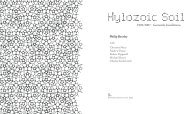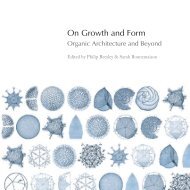The Inner Studio - Riverside Architectural Press
The Inner Studio - Riverside Architectural Press
The Inner Studio - Riverside Architectural Press
Create successful ePaper yourself
Turn your PDF publications into a flip-book with our unique Google optimized e-Paper software.
in the chairs and stand in the room for hours at a time. I could not<br />
leave. Looking back, I would say what attracted me most was the<br />
meditation that these works embodied. Not the meditation of being<br />
swept out of the body, out of matter, but a meditation in matter.<br />
Nakashima’s furniture became a meditation on building a life<br />
centered in the inseparability of physical experience. Viewed this<br />
way everything fell into place and I began to see the possibility that<br />
creating could come from this place inside me. This was where<br />
wisdom comes from. Why do so few objects or places in the world<br />
carry the message of meditation, patience, and reflection? Why<br />
does so little of the built world embody the value of contemplation?<br />
Dream<br />
Dreams may contain ineluctable truths, philosophical pronouncements,<br />
illusions, wild fantasies, memories, plans, anticipations, irrational experiences,<br />
even telepathic visions, and heaven knows what besides.<br />
–C.G. JUNG<br />
THE INNER STUDIO<br />
Architecture at Night: <strong>The</strong> Dream<br />
Dreaming is ancient. A recollected dream can deeply affect our<br />
sense of self and time, giving the present an unforeseen depth,<br />
relating us both to distant ancestors and to new possibilities. A<br />
recollected dream can bring us a sense of wonder or dread and<br />
reminds us that we belong to something beyond our normal experience<br />
of the world. This is because in our normal experience of<br />
the world, we are identified with our ego.<br />
<strong>The</strong> ego is so devoted to its role as decision maker that some<br />
liken it to a ruler in a citadel. <strong>The</strong> ego is not naturally accepting of<br />
other points of view, particularly those coming from sources that<br />
cannot be controlled. In fact, it can be highly resistant to them.<br />
Suggestions and messages from other sources can trigger such<br />
strong tactics as defending or counter-attacking; these responses, in<br />
turn, are often the triggers of conflict. Yet the covert vocation of the<br />
unconscious is to oversee the regular capitulation of the ego’s<br />
strongly held positions in order to teach the ego to accept sources<br />
72





